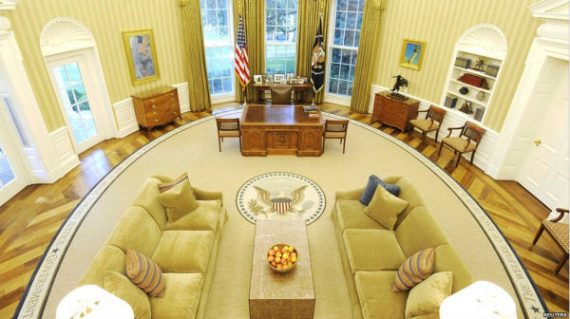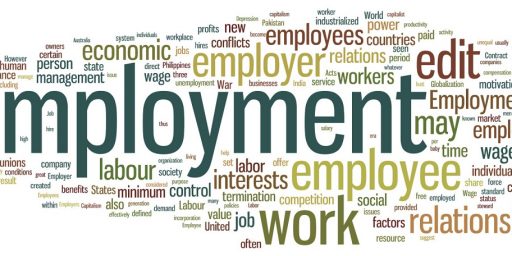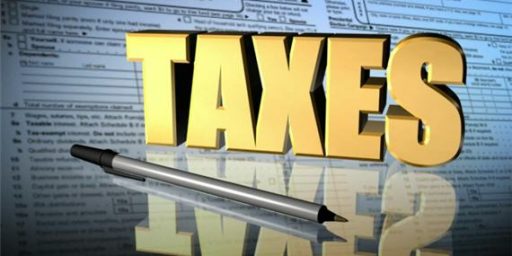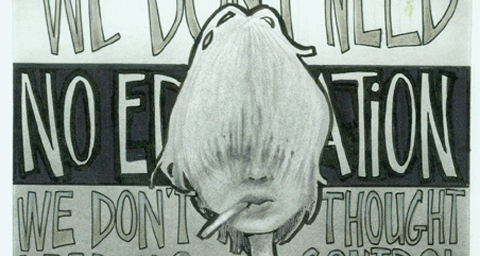Do Businessmen Make Good Presidents?
The Oval Office is nothing like a corporate boardroom.
One of the central tenants of Mitt Romney’s campaign for the Presidency, both now and four years ago, is the idea that his experience as a businessman gives him unique insights into economic issues that he’d be able to put into action as President for the benefit of the entire country. He’s not the first person to make that argument, of course, his father made similar arguments when he ran for President in 1968, as did Ross Perot in 1992 and 1996, and Herman Cain this past year. Additionally, the American public, and the media, has often been fascinated with the allure of the businessman coming in from the outside and “fixing Washington.” In the past, men such as Lee Iaccoca and Donald Trump has seen their names mentioned as potential Presidential candidate, and of course Trump milked that for all it was worth just last year.
The question, though, is whether any of these assumptions that people have about the ability of businessmen, or anyone from outside the political system of that matter, to function at the top of the political ladder are true. Bloomberg’s David Lynch argues, quite convincingly, that they aren’t:
Since 1900, few former businessmen have made it to the Oval Office. The most prominent was the nation’s 31st president, Herbert Hoover, whose handling of the economy during the Great Depression cemented his reputation as a failure.
“Our greatest presidents, like Lincoln and FDR, were career politicians,” says Bruce Miroff, an expert on the presidency at the State University of New York in Albany.
The presidency’s unique requirements mean that everyone who holds the office needs some on-the-job training, something Romney has done before. Still, the White House would bring unfamiliar constraints. There’s no equivalent in the corporate world to the separation of powers that often thwarts a president’s will. And the job demands political savvy more than managerial excellence.
“Our entire system of government is meant to preclude models and skills used in the corporate world, which may be why presidents with business experience are not our most successful presidents,” says Barbara Perry, a senior fellow at the University of Virginia’s Miller Center.
Coming from a profit-centered environment where they enjoy unrivaled authority, executives often stumble amid politics’ fungible goals and multiple power centers, says Mickey Edwards, who served eight terms as a Republican congressman from Oklahoma. And compared with the iron logic of a balance sheet, the politician’s ability to read the public mood — an essential skill for governing — is amorphous.
“You have to like politics,” says former U.S. Representative William Frenzel, 83, a Minnesota Republican, who spent 20 years in Congress after a 16-year business career. “You can’t object to glad-handing. You can’t object to taking some abuse from people you have no reason to take abuse from.”
The late Richard Neustadt, author of the classic study “Presidential Power and the Modern Presidents,” rejected the analogy of the president as an all-powerful CEO, writing: “Presidential power is the power to persuade.”
George W. Bush was the first president with a master’s in business administration. His father, George H.W. Bush, made a fortune in oil before entering politics. In their pre-Oval Office days, Jimmy Carter ran a peanut farm and warehouse and Hoover was a wealthy mining executive and financier.
As Lynch goes on to point out, of those four, only George W. Bush was re-elected, and that happened in the middle of two wars and the still omnipresent wake of the worst terrorist attack in American history.
Perhaps the most important point that Lynch makes is that, contrary to the way people seem to frequently put it, the Presidency is not like being a Chief Executive Officer. Not only does the analogy end up being an incomplete description of presicsely what a President’s duties and role in the Federal Government actually are, but it deliberately ignores the significant differences between the two roles. When a corporate CEO makes a decision, he can reasonably expect that what he decides will be what actually happens, and if it doesn’t then he’s going to fire someone. To some extent, the CEO is restrained by the Board of Directors, which does ultimately have the power to remove him or her, but for the most part what the CEO says goes. No such luck for a President. Even with the way that Presidential powers have expanded in recent years, there is still much that an American President cannot do without the agreement of other branches of government. Often this means having to negotiate with a Congress controlled in whole or in part by the opposing party, but sometimes a President must also deal with opposing factions in his own party. Just ask Barack Obama about that one.
Another issue goes to the entire idea of the outsider President. The President is, above all, a politician and being a successful President means being able to successfully work ones way through the Washington political scene. This doesn’t mean that the President needs to be a Washington insider, of course. Some of our best President — Ronald Reagan and Bill Clinton are two that come to mind — were not part of the Washington scene when they became President, but they had political skills learned from the time they were Governors that they were able to use to great effect in Washington. Of course, being a Governor doesn’t always lead to success in Washington, as Jimmy Carter could testify. For the most part, though, the kind of political skills one tends to learn as a Governor is a prerequisite for being a good President. Businessmen don’t learn those kinds of skills, and they’d have a steep learning curve transitioning from the business world to the Oval Office.
None of this is to say that Romney’s business history isn’t relevant, or that it wouldn’t arguably help him as President. Lynch’s article goes on to relate several anecdotes from people who have worked with Romney in the business world, and during his time as Governor, that seem to suggest that he does indeed have the kind of skills one needs to be President. However, to some extent, if that’s the case it will largely be in spite of his business experience, not because of it.







@Doug Mataconis:
And George W. Bush can thank his brother, Nader, and the Supreme Court for being elected in 2000. And he almost didn’t get reelected.
And I doubt that the kind of business experience Romney has is one that’s needed.
Unless we want the president to loot companies, fire the workers, and then hope that the companies will survive the trauma…
No. No they do not. For one thing, businessmen are driven by one measure of success and one only: money. How do you rate the profitability or ROI on something like a government? Trick question – it’s unimportant. The measure of a government’s success is how its citizens feel about it.
Speaking of which, for another thing, who does a businessman consider the main people he has to keep happy with his performance? The shareholders. The shareholders of a country (a free country, at any rate) ought to be its voting citizens. But “business” candidates have invariably seen only their biggest donors as the only people they need to keep happy. Once a person is elected to office – any public office – their job is to represent the interests of _all_ of their constituents. But many politicians these days openly campaign on the promise that they will actively _screw_ they “other guys”. This is the death of a free, democratic society. And this is why CEO candidates, who think government is nothing more than just another source of revenue, need to be ditched.
The record is not good – Hoover, Carter, GW Bush.
I suspect that one of the modern business types, like Michael Bloomberg might be capable.
The House and Senate are littered with muliti-millionaire business people, some of whom seem to be good congress people, but president is another matter.
Large corporations, have at their heart, the military model for organization which was derived from the Prussians. As Doug pointed out, CEOs have a lot of command and control at their disposal which is different from our political structure. It seems to me that CEOs, are closer to benevolent dictators, and would prosper in some of the more authoritarian countries like Singapore and South Korea. Not a bad model as long as the emphasis is on benevolent.
George W. was a businessman. OK. And he took a budget surplus and turned it into a structural deficit. His Tax Cuts continue to be the single largest driver of the deficit today.
Romney is promising more of the above…literally. Except that instead of starting his economic free-fall from a position near the top of the economic trajectory as Bush did, Romney would be starting his economic free-fall from a point much further down on the curve. Can America really bear more of that sort of business accumen?
Bullshit. Lincoln was a successful legislator for about ten years, lost interest in politics and concentrated on growing his legal practice, until the Nebraska Act called him back into politics. I question whether any President prior to 1900 could be described as a career politician; politics didn’t necessarily pay enough and wasn’t a full time occupation for the most part.
I would argue that strong people skills are far more important. Carter is a good example – my sense is that he came to the White House seeing the President as sort of an uber-Admiral. He would give orders, and people would do what he told them to do.
Does not work too well in practice, especially with Congress. Carter got off to a bad start and it went downhill from there. When Reagan took office, the contrast was stark. He knew how to work with people, and he knew how to lead. He even knew how to work with his enemies, and to reduce the level of toxins in a relationship over time to get results.
Then you have Romney, someone who does appear to be terribly comfortable around people in general, especially people outside of his social class.
Granted having “experience” in any field does not automatically make someone good at anything. Also no one can see the future. Big news. However who is more likely to be qualified for President? Someone with executive experience in business and government, who had to deal “successfully” with a large budget, which has a good understanding of economics or someone who does not? Of course experience itself doesn’t make one good but what one learns from those experience can be helpful.
FYI business CEOs have to deal with internal and external politics and are not these all-powerful dictators that many seem to think they are.
The presidency is unique, sui generis. CEOs don’t make good presidents. Neither do senators. Neither do generals. Neither do Congressional representatives, mayors, or governors.
For every president it’s a case of OJT.
Aristophanes didn’t think so:
I agree. GHWB was arguably the best prepared President in history on paper, but in practice, was just not a very good President. (very strong on foreign policy though). He allowed Sununu to keep him too isolated, he had zero common touch, and very little empathy for and understanding of average Americans. A solid guy, with a long record of accomplishment, but just not right man to sit at the big desk.
@anjin-san:
GHWB, as “most boring President” might have showed a lack of blunder.
I’d say “experiences” are good for people, including the case of business experience for a president. Of course, wide experience is better than narrow.
I don’t know even where to start with this one.
I guess the best starting point is the most egregious one:
That’s an amazingly absurd quote, especially given that the speaker is alleged to be an “expert” on the presidency. Lincoln most definitely was not a career politician. He was a businessman long before he became president. He was owner of a general merchandise store. He also was a practicing lawyer. Geez.
Harry S Truman was a businessman (haberdasherer) before entering politics and not only was he one of our greatest presidents he was one of the world’s greatest leaders.
Reagan ran a trade union before entering politics.
William McKinley was a practicing lawyer and a real estate investor before entering politics.
Hoover’s problem was not being a businessman, it was trying to apply engineering dynamics to the economy.
Lastly, the entire premise of this piece is off base as applied to Romney and to every other person who has served as president. Basically it’s a hypothetical about the unknown and heretofore the unprecedented. Nobody has gone directly from being a company CEO to the presidency. They all had high-level political or high-level military experience before being elected. (Hoover never previously had won an elected office, granted, but he was a cabinet secretary for two presidents before becoming president.)
If Jack Welch up and ran for president then we could have a legitimate debate about whether he truly would be qualified. Until then, however, it’s neither a ripe nor a relevant inquiry. Romney was a state governor. He’s no less qualified than Clinton was.
Tsar…
You make an excellent point.
Although I find it amusing Romney is…well, let’s say…downplaying his job as Governor.
And the Bloomberg article is weak tea; they give unsurprising examples (the CEO tells the VPs what to do at a meeting, and that’s a sign of special leadership?).
@Tsar Nicholas: Neutron Jack for Pres. 😉
@Tsar Nicholas:
It’s legitimate to question the relevance of Romney’s business experience since he’s making it the cornerstone of his campaign.
“Successful Vulture Capitalist” is almost an antonym for “Leader of the Free World.”
@ anjin-san…
I think GHW was/is under-rated.
He got us in and out of Iraq in admirable fashion.
And he raised taxes which…along with Clinton’s tax increases…contributed to the longest run of time without a recession is modern history.
If I thought Romney was remotely capable of either…I could vote for him.
@anjin-san: what accomplishments did gwb have? didn’t he bankrupt all of his oil companies?
sorry i got them mixed up. I agree about ghwb. he wasn’t all that bad. I liked the guy but never voted for him because he didn’t represent my interests. that goes for all repubs.
I don’t like much about Romney but I’m tired of superficial “analysis” claiming to expose his shortcomings. Romney had partners at Bain Capital. He had to work to raise money from outside sources to operate the venture. When Bain invested in firms, Romney generally had to convince incumbent management to execute new strategies Romney was hardly the sit in place, dictatorial boss, that this blog post relates.
@ Let’s Be Free
So what’s the deal then? Romney takes credit for the wins at Bain, but when it come to losses he passes the buck to partners, investors & incumbent management?
@anjin-san:
Oh, please, Romney takes credit for things he actively opposed, and attacks people for supporting things he actually did. This is small potatoes.
Let’s stipulate that Doug’s query is correct.
Don’t we need to ask if “career politicians make good Presidents?” Don’t we need to inquire if “community organizers make good Presidents.?’
Given the state of our national finances, I’d say NoFWay.
Others may differ…….
Yes, of course, because before January 20, 2009, our national finances were in such great shape…
Guess Drew was out of town when GW turned a surplus into a record deficit and led us to the brink of a depression.
Nope, all Obama’s fault. All was well on Jan 1, 2009. Just peachy.
Let’s broaden things a bit, then: “do people who’ve never held any position of real responsibility and accountability make good presidents?”
Granted, things were bad in January 2009. (Two years of a solidly-Democratic Congress certainly didn’t help matters.) But that doesn’t excuse Obama from making things worse. The federal debt skyrocketed, unemployment shot up (even more if you take into account how the labor force has “shrunk” as people simply go off the rolls — I’ve seen estimates that if you take that into account, the unemployment rate is over 11%), and so on.
Why, it’s like Obama had never done anything in his life even remotely resembling the presidency before…
@ Jenos…
By no measure did Obama make things worse.
The economy was in free-fall. It would be unreasonable to expect everything to change course on January 20, 2009.
We were attacked on September 11, 2001. Republicans refuse to accept any accountibility for that event whatsoever even though it was 9 months into Bushs appointment to President. But every single job lost or deficit dollar spent the minute after Obama was inaugurated is his fault.
Talk about wanting it both ways.
Bushs last month in office — December, 2008 the economy contracted at 8.7%. The last measure of GDPgrowth was 2.2%. That’s a swing of 10.9% GDP growth to the positive. On what planet is that making things worse you fool?
I read an article on the subject of what makes for a good president. Want to say it was Gary Wills, but it was twenty years ago, too long to have much chance of finding it again. The occasion was that the historians had had their annual convention and published their usual ranking of the presidents. The article looked at what the guys at the top of the list had in common. The conclusion was surprising and enlightening. Many of them had a professional or serious amateur interest in history which gave them perspective, and most of them were career politicians who had come up thru local and state politics and learned to cut deals so everybody got a piece of the pie and the road got built.
Business people learn that the path to success is to find ways to cut costs and raise prices. It seems to leave them incapable of understanding the circular flow of money, that my price is someone else’s cost. Understanding economics does not make you a good businessman. Conversely, understanding business does not give one any understanding of economics.
If Drew knew anything about finance his opinion might carry some weight.
Actually if Drew knew anything about finance he would know that the biggest single driver of the deficit is the Bush Tax Cuts, followed by the two wars Bush started but couldn’t finish.
But Drew knows nothing about finance, based on the sum total of his comments here.
This is something I can believe, though I’m not sure whether it’s because I want to believe it or not.
@Jenos Idanian:
Don’t be a nitwit. You know as well as I that those things were already in play, that the downward momentum was, at that point, irresistible. You know, Jenos, contrary to what others may think, I think you’re pretty smart guy, but a guy whose intelligence is constantly being bewitched by his ideology.
Don’t you guys know everything resets when a new Democratic President is inaugurated? The deficit goes to zero, wars don’t exist, job losses stop and recessions end. If there is a Democratic President it’s all his fault because he chose to toss all that progress aside.
@PD Shaw: Lincoln was a career politician as much as he was a career lawyer. The fact is, up until he was elected president, he wasn’t great at either. Lincoln didn’t possess a keen business mind. Like Teddy Roosevelt, matters of money bored him. His strength was a keen sense of moral values, a willingness to stand up for what he believed in, and the courage to accept whatever that meant, politically.